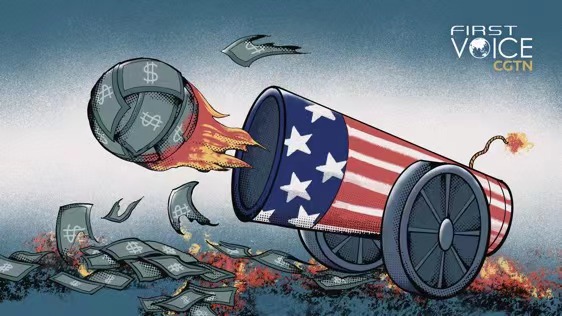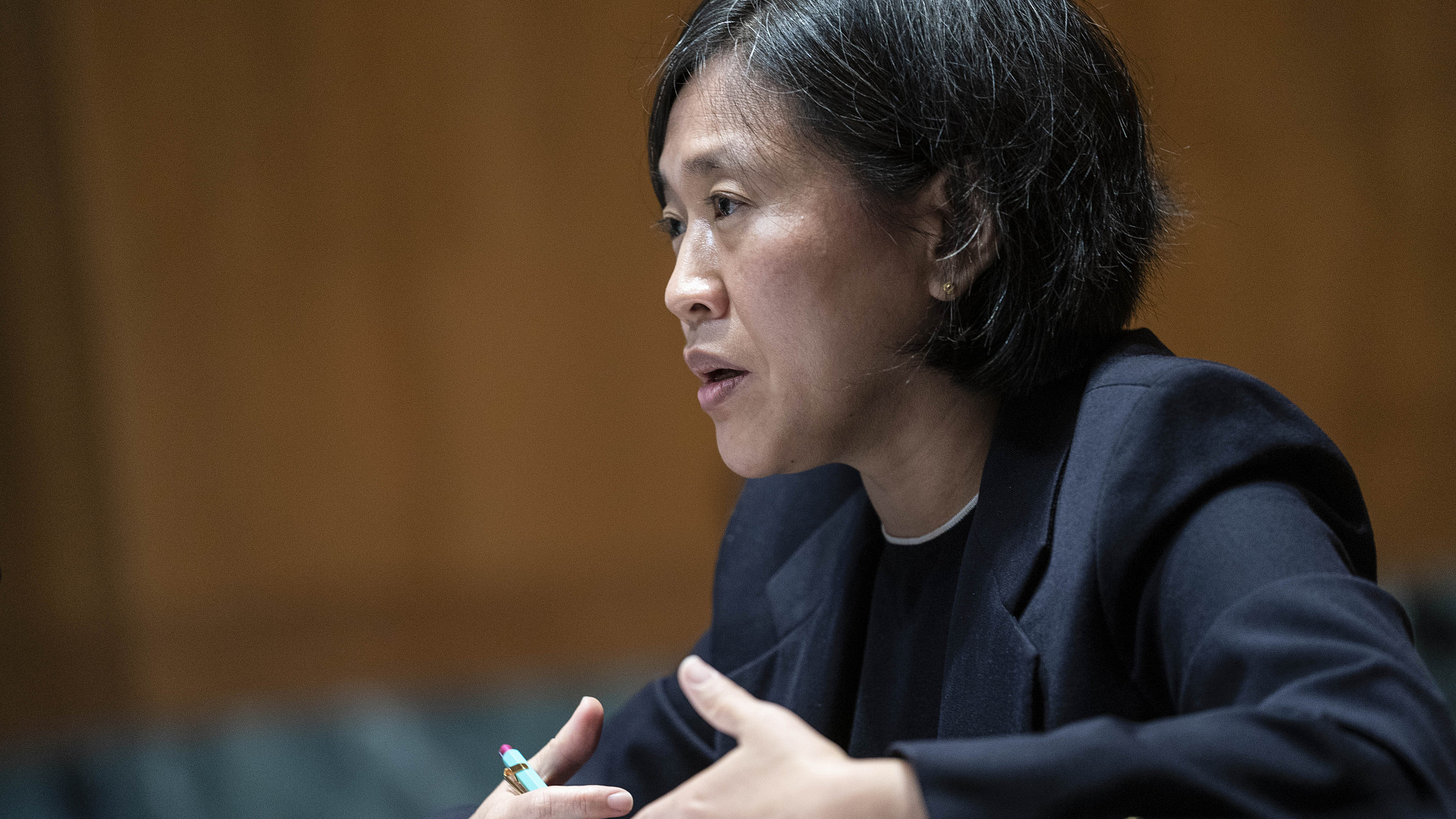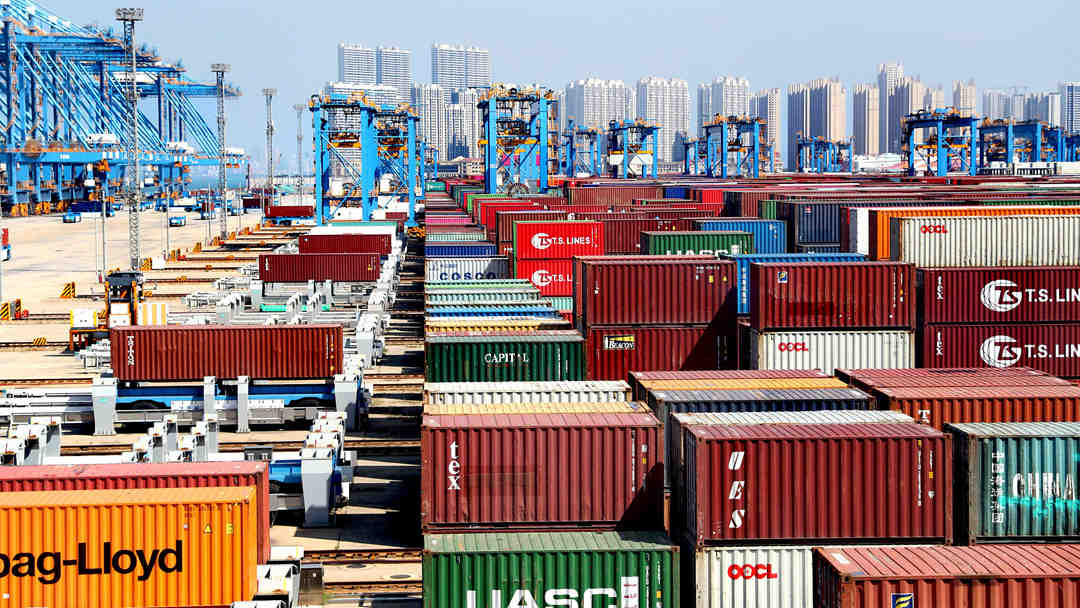
Editor's note: CGTN's First Voice provides instant commentary on breaking stories. The daily column clarifies emerging issues and better defines the news agenda, offering a Chinese perspective on the latest global events.
Speaking before the House Ways and Means Committee on March 30, U.S. Trade Representative Katherine Tai declared that talks with China on issues beyond the China-U.S. phase one trade deal "have been unduly difficult, and we need to turn the page on the old playbook." The statement came a week after her office stated the U.S. would reinstate exemptions on 352 out of 549 categories of Chinese imports from the so-called "Section 301" tariffs.
The whirlwind of a week has seen China-U.S. trade relations appear to be on a path to reconciliation one minute and marching toward confrontation the next. The same kind of contradictory sentiment could also be seen in the House testimony itself. The South China Morning Post has reported that while committee members pressed Tai on toughness against China, they are also interested in making it easier for U.S. companies to win tariff exemptions. "While I'm glad to see a few hundred exclusions were issued last week, the view of our conference is that all Americans affected by the tariffs should have an opportunity to apply for exclusions," said Nebraskan Republican Representative Adrian Smith.
Mary Lovely, a senior fellow at the Peterson Institute for International Economics, commented on the development by saying that China had already made advances in intellectual property protections and opening up foreign direct investments in its financial sector. And an easier tariff exemption process could benefit small- and medium-sized companies. But she added that "the U.S. needs to really think about whether these tariffs serve its own strategic interests."
It seems that Lovely's words align with what happened. Tai's statement is a clear indication of a shift in strategy. The piecemeal trade deals like the ones done under the Trump administration no longer satisfy Tai and the Biden administration's expectations of China's economic system. She specifically mentioned during her testimony that she had "spent a lot of time in the last year continuing to build our relationship on trade bilaterally, but also in multilateral forums… whether it's the G7, the G20, the OECD, the WTO."

U.S. Trade Representative Katherine Tai. /CFP
U.S. Trade Representative Katherine Tai. /CFP
What's clear is that other than strengthening America itself, as Tai told the committee, America's next step in dealing with China is through multilateral institutions and its relationships with various countries. How that will materialize is to be seen. But there must be caution going forward.
For the United States, China has become its greatest long-term geopolitical adversary. And China's economic prowess lies at the center of its competitiveness and value to the international system. Taking China on economically is a priority for both the Trump and Biden administrations.
Under Trump, the method nearly led to the demarcation of the international economy into two. Its targeted pressure campaign inflicted collateral damage on the international supply chain and fanned anti-China sentiment in America and anti-American sentiment in China.
Biden inherited and even advanced some of his predecessor's tactics and, in his mind, to no avail. If Trump's piecemeal sanctions and economic suppression nearly divided the international economy, what would the global economy look like under Biden's yet-to-be-seen multilateral and systematic approach?

The Port of Qingdao in east China's Shandong Province. /CFP
The Port of Qingdao in east China's Shandong Province. /CFP
It's a precarious turn of events at a critical moment. The global geopolitical landscape is shaky. Economies are still suffering under the influence of COVID-19. And in the United States itself, inflation has been running high. The last thing the world needs is uncertainty, unpredictability and confrontation in the China-U.S. trade relationship. It's reasonable to have discussions and negotiations under a multilateral framework. And there are already many important multilateral trade pacts under negotiation or implementation. If America turns that framework into a weapon that tries to exclude or contain China's economic prowess, or forges a trade pact solely to counter China, it'd have catastrophic consequences on standards of living across the globe.
There's no good time to start a confrontation. And confrontation is not something that China seeks. China doesn't shrink from a fight if America insists on one, but it serves everybody better if the two sides could deal with this maturely and responsibly instead of building up small pockets of economic "alliances" with the single aim of containing a certain country.
How China-U.S. trade relations go from this point is uncertain. Whether there will be a trade war is yet to be seen. But a shift in U.S. strategy certainly gets us closer and closer to the precipice of another economic confrontation. How to make sure the world doesn't endure another Trump-like economic tantrum must be on everyone's mind. And politicians in Washington D.C. need to pay special attention.
(If you want to contribute and have specific expertise, please contact us at opinions@cgtn.com. Follow @thouse_opinions on Twitter to discover the latest commentaries in the CGTN Opinion Section.)

